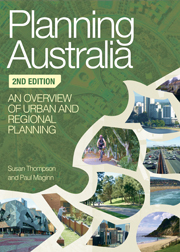Book contents
- Frontmatter
- Contents
- Contributors
- Figures and tables
- Discussion points and case studies
- Preface
- Acknowledgments
- Abbreviations
- Table of statutes
- Introduction
- Part I Frameworks
- 1 What is planning?
- 2 Planning and governance
- 3 Planning as a profession
- 4 An historical perspective
- 5 Statutory planning
- Part II Key Issues
- Index
- References
3 - Planning as a profession
from Part I - Frameworks
- Frontmatter
- Contents
- Contributors
- Figures and tables
- Discussion points and case studies
- Preface
- Acknowledgments
- Abbreviations
- Table of statutes
- Introduction
- Part I Frameworks
- 1 What is planning?
- 2 Planning and governance
- 3 Planning as a profession
- 4 An historical perspective
- 5 Statutory planning
- Part II Key Issues
- Index
- References
Summary
Key terms: professions; professionalisation; professional organisation; planning practice; accreditation; Planning Institute of Australia; interdisciplinary practice.
Planners involved in planning organisations – such as the Planning Institute of Australia (PIA), the New Zealand Planning Institute (NZPI), the Royal Town Planning Institute (RTPI) in the United Kingdom, the Canadian Institute of Planners (CIP) and the American Institute of Planners (AIP) – are very keen to position themselves as belonging to a profession and a distinct discipline. Why is this? Is it that professions, as social constructs, can have significant impacts on politics, economics and social behaviour? As long as planners do their jobs, why does it matter whether the act of planning is considered a professional activity? These questions are at the heart of this chapter, which distinguishes between the practice and the profession of planning.
Planning practice – that is, what planners do – includes contributing to the development and management of safe, healthy, nurturing and sustainable physical, economic and social communities. The socio-cultural, political and economic systems of the contemporary world are inextricably linked, and planners are becoming increasingly central to the successful balance of this ‘triple bottom line’, as it is known. As a result, they often come from or move into interdisciplinary fields and find themselves working with other professionals (for example, health professionals, architects, lawyers and urban designers), key stakeholders and the general public on a broad range of issues. They work in private industry, all levels of government, non-government organisations, and teaching and research units. Increasingly, planners are key players in multidisciplinary teams solving complex urban and regional issues.
- Type
- Chapter
- Information
- Planning AustraliaAn Overview of Urban and Regional Planning, pp. 56 - 72Publisher: Cambridge University PressPrint publication year: 2012



